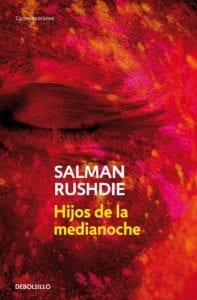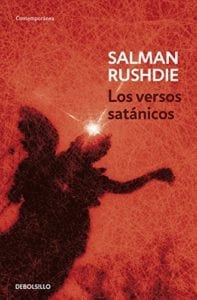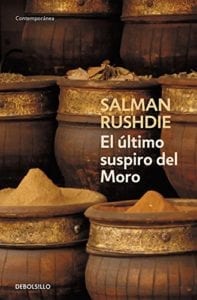
Born two months before the independence of India, a motif that would inspire one of his most famous works, Salman Rushdie ((Bombay, 1947) is one of India's most influential authors and, in turn, one of the most controversial of the 1988th century. Persecuted since XNUMX by the ayatollah Iranian Ruhollah Khomeini, who considered his novel The Satanic Verses as an offense against Islam, Rushdie has spent thirty years between light and darkness, perpetuating a magical and unique bibliography often influenced by magical realism and that we review through the following best Salman Rushdie books.
Children of midnight

The fact of having been born two months before the independence of India It allowed Rushdie to experience the changes in an India still divided between tradition and modernity, between the West and its own culture. Reflections that would result Children of midnight, book set during the night of August 15, 1947, the day that India became an autonomous country and the moment of the birth of Saleem Sinai, protagonist and narrator through whose life we also know the most important political moments of his own nation. The book, which became a sales phenomenon after its publication in 1981, won the Booker Prize and the James Tait Black Prize.
Shame

Many critics conceived Shame after its publication in 1983 as an unclassifiable but necessary work, totally addictive. Set in Peccavistan, an imaginary country sometimes far from reality, Shame is a tragedy in which the stories of different characters marked by shame are staged, from Omar Khayyam, the son of three mothers, to General Hyder and his huge dark circles. One of the most curious novels by Rushdie.
Satanic verses

Although the magical realism It was always a hallmark of Latin American literature. Certain Indian authors such as Arundhati Roy and Salman Rushdie have made use of it in works where reality and fantasy are easily intermingled. A good example is Satanic verses, in turn Rushdie's most controversial book. The novel tells the story of two Bollywood actors, Gibreel Farishta and Saladin Chamcha, whose plane is taken by terrorists, causing them to fall into the sea. After surviving, both characters experience visions that transport them to the perspective of other characters, such as that of the young Indian prophet Ayeesha, or a version of Muhammad that involves an interpolation in the Koran. The latter story did not appeal to the Muslim masses, especially a nation in Iraq whose religious leader, Ayatollah Ruhollah Khomeini, ordered the death of the author after the book was published in 1988. Currently, the fatwa (or sentence) against Rushdie is still in force, having amounted to 2.8 million dollars.
Harún and the sea of stories

Rushdie published this set of accounts in 1990, 19 months after having to hide behind the fatwa to which he was sentenced after the publication of The Satanic Verses. Difficult times in which the author wrote this book for his son Zafar, spinning new forms of children's narrative through the words of Rashid Khalifa, the best storyteller who, from one day to the next, loses the ability to continue narrating. A block that he will try to overcome with the help of his son, Harún, who helps him regain his capacity. Considered an allegory of the complicated situation that the writer was going through and the nostalgia for his son, his wife and the family home, Harún and the sea of stories is possibly one of Rushdie's most personal books, suitable for all audiences.
The last breath of the Moor

Considered by many to be one of his best books, The Moor's Last Sigh, published in 1995, tells the story of the last member of the Zogoiby family, Moraes el Moro, who from his grave recounts the life of his family. The protagonist, a man who ages at a faster rate than the rest of society supposes an ode to the decadence of the world and the social conflicts of a country as turbulent as India but also to the love and goodness radiated by a character that goes back from the events of contemporary India to the existence of the last Moorish king of Spain.
The ground beneath your feet

Conceived as a version of the myth of Orpheus and Eurydice, The ground beneath your feet tells the story of Vina Apsara, a young singer with a wild voice desired by two men: Ormus Cama and his friend, the photographer Rai, who is also the narrator of the story. The novel is set in the time when rock It reached its peak, so the novel has numerous references to the genre at the same time that it is a criticism of this impossible union between East and West. The novel was published in 1999.
Shalimar the clown

Published in 2005, Shalimar the clown tells the dire consequences of a love affair through the eyes of its protagonist, a terrorist who calls himself Shalimar the clown. The same Muslim chauffeur who, one morning in 1991, assassinated former Indian ambassador and US counterterrorism chief Maximilian Ophuls. The problem begins when the investigations discover the origin of a not so simple motive in which the identity of the daughter of Ophuls is discovered as ex-lover of Shalimar when he was working as a diplomat in troubled Kashmir.
The enchantress of Florence

Definitive proof of Rushdie's good work to turn words into magic, The enchantress of Florence it goes back to historical events older than those to which the author is accustomed. More specifically, it takes us to the court of Akbar the Great, cradle of the Mughal empire, in the Indian city of Fatehpur Sikri at the end of the 2008th century, a time when the different battles that would define India as the country would take place. An episode that is influenced by the story of a man who comes to court, one about a woman of beauty and a captivating voice with great gifts for witchcraft. One of his best books which was published in XNUMX.
What are for you Salman Rushdie's best books?